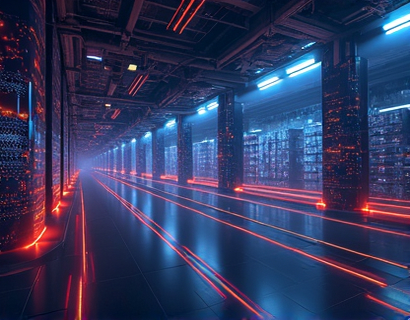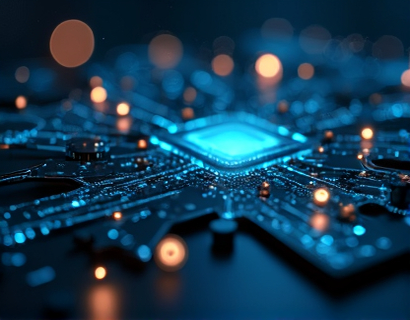AI-Powered Adaptive Education: Transforming Learning for Students and Lifelong Learners
In the rapidly evolving landscape of education, the integration of Artificial Intelligence (AI) has ushered in a new era of personalized learning. This AI-driven educational paradigm is revolutionizing the way students and lifelong learners access and engage with educational content. By leveraging advanced algorithms and machine learning techniques, these platforms deliver adaptive lessons that cater to individual needs, preferences, and learning styles. This transformation not only enhances the learning experience but also maximizes the potential of each learner, making education more accessible, engaging, and effective.
The core principle behind AI-powered adaptive education is to create a dynamic and responsive learning environment. Traditional educational models often follow a one-size-fits-all approach, which can leave many students struggling to keep up or feeling under-challenged. In contrast, adaptive learning systems use real-time data and analytics to tailor the educational journey for each user. This personalized approach ensures that learners receive the right content at the right time, fostering a more efficient and effective learning process.
One of the most significant advantages of AI-powered adaptive education is its ability to provide instant feedback. Unlike human instructors who may not always have the bandwidth to offer immediate responses, AI systems can instantly assess a learner's performance and provide constructive feedback. This immediate reinforcement helps learners understand their mistakes and correct them on the spot, reinforcing positive learning habits and accelerating the learning curve.
Moreover, AI-driven platforms create a supportive learning environment that adapts to the emotional and cognitive states of the learner. By monitoring engagement levels, frustration, and interest, these systems can adjust the difficulty and type of content presented. For instance, if a learner is showing signs of frustration, the system might introduce a simpler version of the task or provide additional resources to build confidence. Conversely, when a learner is engaged and performing well, the system can introduce more challenging material to keep them motivated and stimulated.
The customization of learning experiences extends to accommodating diverse learning styles. Some individuals are visual learners, benefiting from diagrams and videos, while others are auditory learners who thrive with lectures and discussions. AI adaptive education platforms can identify a learner's preferred style and deliver content accordingly. This flexibility ensures that each learner receives information in the most effective format, enhancing comprehension and retention.
Personalization in AI-powered education is not limited to content delivery. These platforms also consider the unique backgrounds, experiences, and goals of each learner. For example, a professional looking to upskill in a specific area will have different needs compared to a student pursuing a degree in the same field. AI systems can take these factors into account, curating a learning path that aligns with the learner's objectives and prior knowledge.
Another critical aspect of AI-driven adaptive education is its role in lifelong learning. In today's fast-paced world, continuous learning is essential for staying relevant in the job market and personal growth. AI-powered platforms make lifelong learning more accessible by offering flexible, on-demand educational resources. Learners can access high-quality content anytime, anywhere, allowing them to fit learning into their busy schedules without compromising on quality.
For students, the benefits of AI-powered adaptive education are manifold. These platforms help bridge knowledge gaps and ensure that no student is left behind. By identifying areas where a student may be struggling, the system can provide targeted interventions and additional practice exercises. This personalized support system not only boosts academic performance but also builds confidence and resilience. Students are more likely to persist in challenging subjects and develop a love for learning when they see tangible progress and receive encouragement.
Professionals and working adults also stand to gain significantly from AI-powered adaptive learning. The ability to upskill and reskill in a fraction of the time and with greater efficiency is invaluable in today's competitive job market. AI-driven platforms offer specialized courses and modules that cater to the specific needs of various industries, ensuring that learners acquire the most relevant and in-demand skills. This continuous professional development is crucial for career advancement and maintaining a competitive edge.
The interactive nature of AI-powered educational experiences further enhances engagement and retention. Traditional passive learning methods, such as reading textbooks or attending lectures, can be monotonous and less effective. In contrast, adaptive learning platforms incorporate interactive elements like simulations, gamification, and collaborative projects. These engaging activities not only make learning more enjoyable but also promote active participation and deeper understanding of the material.
Collaboration is another key feature of AI-driven adaptive education. These platforms often include tools that facilitate peer-to-peer learning and interaction with instructors. Learners can join study groups, participate in discussions, and receive feedback from multiple sources. This collaborative environment fosters a sense of community and shared learning, which can be particularly beneficial for those who learn best through social interaction.
The data-driven approach of AI adaptive education also provides valuable insights for educators and administrators. By analyzing learner data, educators can identify trends, common challenges, and areas where the curriculum may need adjustment. This data can inform instructional strategies and help create more effective teaching methods. Additionally, administrators can use these insights to optimize resource allocation and improve overall institutional performance.
Despite the numerous benefits, the implementation of AI-powered adaptive education is not without challenges. One of the primary concerns is data privacy and security. Ensuring that learner data is protected and used ethically is paramount. Educational institutions and platform providers must adhere to strict data protection standards and be transparent about how data is collected, stored, and utilized.
Another challenge is the potential for over-reliance on technology. While AI can greatly enhance the learning experience, it should complement rather than replace human interaction. Instructors play a vital role in providing emotional support, mentorship, and personalized guidance that AI systems cannot fully replicate. Striking the right balance between technology and human touch is essential for a holistic educational experience.
To address these challenges, it is crucial to develop robust frameworks and guidelines for the ethical use of AI in education. This includes regular audits, compliance with regulatory standards, and ongoing training for educators and administrators. By prioritizing ethical considerations, the educational community can harness the power of AI while maintaining the integrity and quality of learning.
In conclusion, AI-powered adaptive education represents a significant leap forward in personalized learning. By delivering tailored lessons, providing instant feedback, and creating supportive environments, these platforms empower students and lifelong learners to reach their full potential. The interactive and data-driven nature of these systems not only makes education more accessible and engaging but also ensures that learners are well-equipped to succeed in an ever-changing world. As technology continues to evolve, the potential for AI to transform education remains vast, promising a future where learning is truly personalized and effective.










































